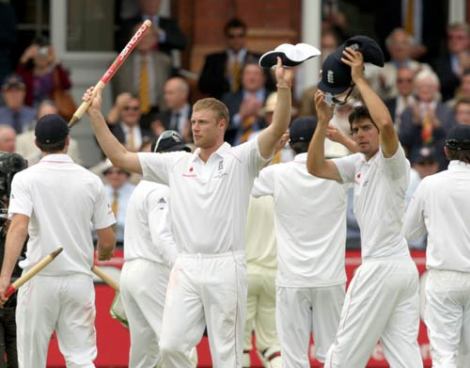It has been a long time since I've felt genuine affection for an English cricketer. More precisely, since David Gower and Ian Botham packed up their kitbags and left. Freddie Flintoff stepped into the breach, and despite my initial viewing of him as a drunken soccer oaf, he managed to impress me with his ability to ratchet up the atmosphere in a Test match with his justifiably famous spells, to be combative with batsmen while not descending into puerile abusiveness, to hit the ball hard and long, and with all those other ineffable qualities that make disbelievers into
Freddie fans. Flintoff evokes feelings in me that remind me of my childhood following of cricket.
But in all of this, I have never considered Flintoff a 'great' cricketer just like I never considered many other darlings of mine (like Kim Hughes for instance) to be greats. And it dismays me to see that term thrown about so freely in this Ashes summer as the English media gear up, almost hopefully, for a final orgy of Freddie-anointing. Good yes, talented yes, mercurial yes, brilliant to watch yes. But great? No.
If one is to believe the emanations of the English press after the Lord's Test, it is possible for a bowler to be called great despite possessing the mediocre statistics that Flintoff does (he has, I might like to remind readers, not even taken three wickets per test over his career), for a player to be called a great Ashes performer despite leading his side to a 0-5 whitewash at the hands of the Great Enemy (and visibly losing all control of his team as the series wore on), for an allrounder to be called great despite only being able to swing an occasional match in favour of England with his bowling and batting.
While statistics do lie on occasion, there is something to be said for reserving the adjective 'great' for those cricketers able to maintain and sustain a high level of cricketing performance over an extended period of time. To call Flintoff a 'great' Test cricketer is to admit him to an exclusive club whose membership has taken far more work, dedication, skill and longevity on the part of its members than Freddie has been able to show.
Flintoff's famous injuries have managed to obscure the fact that he has not taken smart decisions with his body, in choosing to play certain games and not others. The Flintoff legend makes these injuries sound like the fates conspiring against him, a biological conspiracy of sorts. But reality is a little more prosaic than that.
Cricket fans are familiar with the archetypal figure of the talented-but-not-great cricketer: men who showed dazzling displays of brilliance but were unable to sustain it over their careers. These men provoke passionate defenses on the part of their fans that typically take the form of "You say X is a great cricketer but I'd rather watch a short innings by Y any day" and so on. These men encourage a disdain for statistics, for the stories the scoreboards and record books tell.
A great cricketer leaves his mark on the game over an extended period of time, by performing well at home and away, by setting standards (yes, statistical ones too) for others to try and emulate, by being a pioneer in some fashion. Flintoff has come close to doing some of these things but he is not there yet.
Flintoff will always be remembered as a wonderfully exciting cricketer that managed to make a couple of Ashes series played in England the stage for some great cricketing theatre. But the rest of his career, his away performances, his inconsistency, his early retirement from test cricket, will ensure that he will not be considered a great cricketer - at least in the eyes of many folks who don't write for English newspapers.
Samir Chopra lives in Brooklyn and teaches Philosophy at the City University of New York. He tweets here
